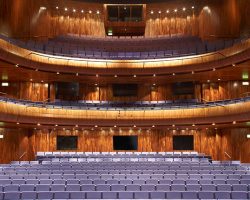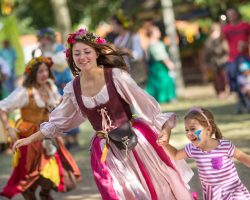
World’s Best Opera Festivals
Best Finds in Opera Festivals
Come learn about where you can go to see the top opera festivals in the world.
Glyndebourne Festival -Glyndebourne, England
May 18-Aug. 31
Those who sing at Britain’s premier summer music event are the opera world’s best, and those who manage to get tickets rightly wear their attendance as a badge of sophistication. Highlights of the 2008 edition include a new commission, “Love and Other Demons” (adapted from the novella by Gabriel Garcia Marquez), Richard Strauss’ “Hansel und Gretel” and Monteverdi’s last work, “L’incoronazione di Poppea.” Advance booking is essential.
Where to stay: Newick Park Hotel & Country Estate is a bit of a drive but a beautiful property.
Bregenzer Festspiele -Bregenz, Austria
July 23-Aug. 23
While the audience at this open-air festival is on dry land, the stage actually floats in Lake Constance, moored to an artificial island. Avant-garde scenery adds to the otherworldly appeal. In fact, the set is so elaborate that each production has a two-year run. The festival opens July 23 with Puccini’s “Tosca.” Popularity with cultural tour groups means tickets sell out fast.
Where to stay: Gourmet-Hotel Deuring Schlossle. Heino and Bernadette Huber run this castle hotel with views of Lake Constance; Bernadette is sommelier at the hotel’s restaurant.
Santa Fe Opera -Santa Fe, N.M.
June 27-Aug. 23
Since its debut in 1957, the Santa Fe Opera has become one of the world’s foremost summer opera festivals, attracting the biggest names in opera such as French star soprano Natalie Dessay, who in 2006 sang the role of Pamina in Mozart’s “The Magic Flute” here for the first time anywhere. Says Wayne Tigges, a bass-baritone who has performed there, “the opera house has an impressive roof on it, with an otherwise outside venue. The stage is very open, and allows an audience to see the hillside and beautiful scenery of Santa Fe behind it.” Savvy travelers are booking their tickets now.
Where to stay: The Inn and Spa at Loretto, for that luxury pueblo look.
Lucerne Festival -Lucerne, Switzerland
March 8-16 and Aug. 13-Sept. 21
The Lucerne Festival in Summer offers numerous performances, united this year by the theme of “Dance Music.” From its own Lucerne Festival Orchestra conducted by Claudio Abbado, to the American orchestras of Chicago, Cleveland and New York, to a stellar cast of soloists and conductors, the festival is one of Europe’s top musical events. Says American soprano Renée Fleming, “The calmness of the lake and mountains enhances the musical experience in the best possible way.”
Where to stay: The Hotel. This Jean Nouvel-designed hotel features old movie stills blown up and mounted on the ceilings of the 25 rooms.
Chorégies d’Orange -Orange, France
July 12-Aug. 5, 2008
Started in 1860, this is France’s oldest festival. Regular appearances by international opera stars like Roberto Alagna and Angela Georgiou almost play second fiddle to the jaw-dropping setting: a perfectly preserved Roman theater that seats 9,000. When floodlit at night, it’s a sight to behold. Tickets are already on sale for next summer’s performances of Verdi’s “Requiem,” Gounod’s “Faust” and Faure’s “Requiem”-and they go fast.
Where to stay: The Chateau de Montcaud has bright, cheerful rooms and a gourmet restaurant.
Savonlinna Opera Festival -Savonlinna, Finland
July 4-Aug. 2, 2008
With Olavinlinna Castle (constructed in 1475) as a backdrop, the drama in Finland starts even before the orchestra does. This year’s operas include Verdi’s Rigoletto and Aida as well as two premieres (“Mefistofele” and “The Seven Dog Brothers”), but one performance that’s sure to sell out fast is a July 13 concert by tenor Roberto Alagna.
Where to stay: Hotel Pietari Kylliainen
Festival d’Aix-en-Provence -France
June 27-July 23
One of France’s most beautiful southern cities is also home to one of its most prestigious music festivals. It started in 1948 and over the years boldfaced names in the music world have been associated with it, including conductor Simon Rattle and conductor and composer Pierre Boulez. Next summer’s six opera line-up includes Mozart’s “Zaide” and “Cosi fan tutte”; there will also be a July 22 recital by Finnish diva Karita Mattila. Tickets for all performances go on sale online January 23.
Where to stay: The trendy restaurant Bastide du Cours on the busy Cours Mirabeau also has a number of upscale guestrooms.
Tanglewood -Lenox, Mass., U.S.
June 26-Aug. 24
Tanglewood, with its famous Music Shed and vast lawn, has been the summer home of the Boston Symphony Orchestra since 1937 and concerts there are the peak of high culture in the Berkshires. The 2008 season opens with Hector Berlioz’ epic opera “Les Troyens;” James Levine conducts. There are also All-Beethoven and All-Mozart weekends, a concert performance of Tchaikovsky’s “Eugene Onegin” and more.
Where to stay: Wheatleigh, for that Irish country estate feel.
Salzburg Festival -Austria
July 26-Aug. 31
The Salzburg Festival is a heavyweight festival contender for hardcore opera fans. One of the performance venues is the Felsenreitschule, or Former Riding School, which many Americans will recognize as the place where the von Trapp Family sings in the final scene of “The Sound of Music” (a film which the Salzburg tourist board officially calls “very tacky”). New productions include “Don Giovanni,” “Otello” and “The Magic Flute.”
Where to stay: Julie Andrews gamboled in meadows close to The Schloss Fuschl Resort.
Wexford Festival Opera -Wexford, Ireland
Oct. 16-Nov. 2, 2008
Little Wexford is home to one of the world’s most vibrant opera fests, specializing in “hidden treasure” works by lesser-known composers who were nevertheless big names in their day. In 2008, the 57th season, there will be performances of the 19th century operas “Tutti in Maschera (Everyone in Disguise)” by Carlo Pedrotti and “The Snow Maiden,” a Russian work. A new opera house will be inaugurated as well.
Where to stay: The Talbot Wexford is a charming hotel.
Arena di Verona Festival -Verona, Italy
June 20-Aug. 31
This venerable festival’s 86th season will feature six operas for a total of 50 performances taking place in the ancient Roman Arena di Verona amphitheater. Works include a new production of “Aida,” followed by “Tosca,” “Nabucco,” “Carmen” and “Rigoletto.” Verona concludes, appropriately enough, with a new production of Gounod’s “Romeo et Juliette.”
Where to stay: The luxury Hotel Villa del Quar is four miles from the center of Verona.

